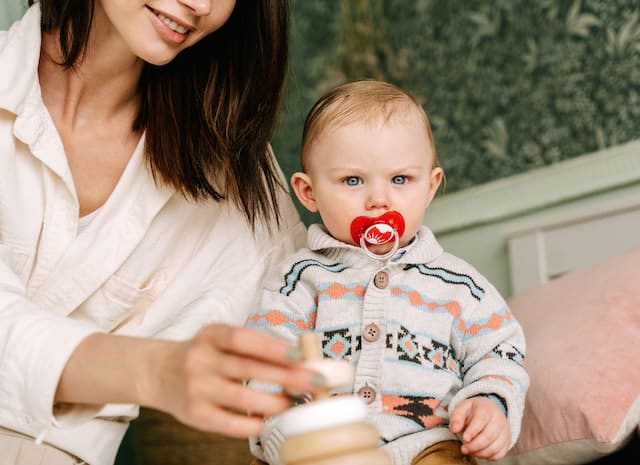Pacifiers are a common tool used to soothe fussy babies and promote sleep. However, many parents struggle with keeping the pacifier in their baby’s mouth, leading to frequent disruptions in sleep and increased stress for both the baby and parents.
Fortunately, there are several tips and tricks that parents can use to help keep the pacifier in their baby’s mouth.
One of the first steps in keeping the pacifier in the baby’s mouth is to choose the right pacifier. Different pacifiers have different shapes and sizes, and it’s important to find one that fits your baby’s mouth comfortably.
Additionally, some pacifiers are designed specifically for nighttime use and may be more effective in helping your baby sleep through the night.
Another important factor in keeping the pacifier in your baby’s mouth is proper pacifier hygiene and safety. Pacifiers should be cleaned regularly and replaced if they become damaged or worn.
Additionally, parents should always supervise their baby while they are using a pacifier to prevent choking or other safety concerns.
Key Takeaways
- Choosing the right pacifier is important for keeping it in your baby’s mouth.
- Proper pacifier hygiene and safety are crucial for your baby’s health and well-being.
- There are several tips and tricks that parents can use to help keep the pacifier in their baby’s mouth, including finding the right size and shape of pacifier and supervising their baby while they use it.
Understanding the Use of Pacifiers
Pacifiers are a common tool used by parents to soothe their babies. They are small, nipple-shaped objects that babies can suck on to help calm and self-soothe.
The sucking reflex is a natural need for babies and pacifiers can provide a way to fulfill that need.
While pacifiers can provide comfort for babies, it is important for parents to understand the potential benefits and drawbacks of using them.
Here are some things to consider when it comes to pacifiers:
Benefits of Using a Pacifier
- Pacifiers can help soothe and calm babies, especially during times of stress or discomfort.
- Sucking on a pacifier can help babies fall asleep and stay asleep longer.
- Pacifiers can provide a sense of security and comfort for babies, especially when they are separated from their parents or in unfamiliar environments.
- Some studies suggest that pacifiers may reduce the risk of sudden infant death syndrome (SIDS).
Drawbacks of Using a Pacifier
- Overuse of pacifiers can lead to a habit that is difficult to break and may cause dental problems.
- Pacifiers can interfere with breastfeeding, so it is important to establish a good breastfeeding routine before introducing a pacifier.
- Pacifiers can become a crutch for parents, who may rely on them too heavily to soothe their babies.
- Some babies may become dependent on pacifiers and have trouble self-soothing without them.
Overall, pacifiers can be a useful tool for parents to help soothe their babies. However, it is important to use them in moderation and be aware of the potential drawbacks.
Parents should also pay attention to their baby’s individual needs and preferences when it comes to pacifiers.
Choosing the Right Pacifier
When it comes to pacifiers, there are a lot of options to choose from. It can be overwhelming to decide which one is right for your baby.
In this section, we will cover some of the factors to consider when choosing a pacifier.
Shape and Size
Pacifiers come in different shapes and sizes. Some are designed to fit a baby’s mouth better than others. It’s important to choose a pacifier that is the right size for your baby’s age and mouth.
A pacifier that is too small can be a choking hazard, while one that is too large can be difficult for a baby to keep in their mouth.
Preferences
Babies can be picky about their pacifiers. Some prefer a certain shape or texture, while others may not like certain materials. It’s important to pay attention to your baby’s preferences when choosing a pacifier.
If your baby doesn’t like the pacifier you chose, try a different one until you find one they like.
Orthodontic Pacifiers
Orthodontic pacifiers are designed to promote healthy oral development. They have a flatter shape and are designed to fit a baby’s mouth better than traditional pacifiers. If you’re concerned about your baby’s oral development, an orthodontic pacifier may be a good choice.
Silicone Pacifiers
Silicone pacifiers are a popular choice because they are easy to clean and sterilize. They are also more durable than latex pacifiers. However, some babies may not like the feel of silicone pacifiers.
Different Pacifier Styles
There are a variety of pacifier styles to choose from. Some have a ring that makes it easier for parents to remove the pacifier from their baby’s mouth, while others are designed to stay in place better.
Some pacifiers also come with a cover to keep them clean when not in use.
Overall, when choosing a pacifier, it’s important to consider your baby’s age, mouth size, and preferences. It may take some trial and error to find the right pacifier for your baby, but with a little patience, you’ll find one that works well for both you and your baby.
Pacifier and Sleep
Using a pacifier can help soothe a fussy baby, especially during sleep time. However, parents may find it challenging to keep the pacifier in their child’s mouth throughout the night. Here are some tips to help keep the pacifier in place during sleep:
- Choose the right size: Make sure to choose a pacifier that is the appropriate size for your baby’s age and mouth size. A pacifier that is too small or too big can be difficult to keep in place during sleep.
- Use pacifier clips: Pacifier clips can be attached to your baby’s clothing to prevent the pacifier from falling out of their mouth during sleep.
- Reinforce positive sleep associations: Encourage your baby to associate the pacifier with sleep by offering it to them when they are drowsy or ready for sleep. This can help them feel more comfortable and relaxed during sleep time.
- Avoid overuse: Overusing a pacifier can lead to dependence and may interfere with healthy sleep patterns. It is important to gradually wean your baby off the pacifier as they get older and develop other self-soothing techniques.
- Be mindful of Sudden Infant Death Syndrome (SIDS): While pacifiers have been shown to reduce the risk of SIDS during sleep, it is important to follow safe sleep guidelines and avoid placing anything in the crib that could pose a suffocation risk.
Overall, using a pacifier during sleep can be a helpful tool for soothing a fussy baby.
By choosing the right size, using pacifier clips, reinforcing positive sleep associations, avoiding overuse, and being mindful of SIDS risks, parents can help keep the pacifier in place and promote healthy sleep habits for their little ones.
Pacifier and Breastfeeding
Using a pacifier can be a great way to soothe a fussy baby, but it’s important to use it correctly to avoid any negative effects on breastfeeding. Some parents worry that using a pacifier will cause nipple confusion and interfere with the baby’s ability to breastfeed properly, but this is not always the case.
In fact, some studies have shown that using a pacifier during feedings can actually help babies breastfeed more effectively.
This is because the sucking motion required to use a pacifier is similar to the sucking motion required to breastfeed, and using a pacifier can help babies develop the muscles they need to breastfeed more efficiently.
However, it’s important to use a pacifier in moderation and not rely on it too heavily. Using a pacifier too often can lead to overfeeding and interfere with the baby’s ability to regulate their own hunger cues. It’s also important to establish a solid nursing routine before introducing a pacifier to avoid any confusion.
When using a pacifier, it’s best to offer it after a feeding rather than during, to ensure that the baby is getting enough breast milk. It’s also important to choose the right type of pacifier – look for one that is designed for breastfeeding babies and has a shape and size that is similar to a nipple.
Overall, using a pacifier can be a helpful tool for parents, as long as it is used correctly and in moderation. By following these guidelines, parents can help ensure that their baby is getting enough breast milk and is able to breastfeed effectively.
Pacifier Hygiene and Safety
Pacifiers can be a great comfort for babies, but it’s important to take proper care of them to ensure they remain safe and hygienic.
Here are some tips to keep your baby’s pacifier clean and reduce the risk of dental problems, suffocation, and other safety concerns.
Cleaning and Replacing Pacifiers
It’s important to clean your baby’s pacifier regularly to prevent the buildup of harmful bacteria. Replace pacifiers every two to four weeks or as soon as they show signs of wear and tear.
Here are some tips for cleaning and replacing pacifiers:
- Wash pacifiers with soap and water before each use.
- Boil pacifiers for five minutes to sterilize them.
- Avoid using honey or other sweeteners on pacifiers, as this can increase the risk of tooth decay.
- Check pacifiers regularly for signs of damage, such as cracks or tears, and replace them if necessary.
Pacifier Clips and Cords
Pacifier clips and cords can be useful for keeping pacifiers within reach, but they can also pose a strangulation risk.
Follow these safety tips when using pacifier clips and cords:
- Always supervise your baby when using a pacifier clip or cord.
- Never attach a pacifier cord to a crib, playpen, or other object within reach of your baby.
- Choose pacifier clips and cords that are short and do not pose a strangulation risk.
Dental Problems and Other Safety Concerns
Prolonged pacifier use can lead to dental problems such as misaligned teeth and bite issues.
Here are some tips to reduce the risk of dental problems and other safety concerns:
- Limit pacifier use to naptime and bedtime.
- Encourage your baby to stop using a pacifier by age two.
- Talk to your doctor if you have concerns about your baby’s pacifier use or dental health.
By following these simple tips, you can help ensure your baby’s pacifier remains safe and hygienic.
Pacifier and Soothing Techniques
Pacifiers can be a great tool for soothing a crying baby. However, sometimes babies have trouble keeping the pacifier in their mouth.
Here are some tips for keeping the pacifier in place and other soothing techniques to help calm your baby:
- Use a pacifier clip: Attaching the pacifier to your baby’s clothes with a clip can help keep it from falling out of their mouth. Just make sure the clip is securely fastened and not too close to your baby’s neck.
- Try different pacifier shapes: Some babies may prefer a certain shape or brand of pacifier. Experiment with different types to see what your baby likes best.
- Offer a stuffed animal: A soft, cuddly stuffed animal can provide comfort and a distraction for your baby. Just make sure it’s safe and doesn’t have any small parts that could be a choking hazard.
- Encourage self-soothing: As your baby gets older, they may start to suck on their thumb or find other ways to self-soothe. While it’s important to monitor these behaviors, they can be a natural way for your baby to calm themselves down.
- Provide distractions: Sometimes a change of scenery or a new toy can be enough to distract your baby from their upset. Try singing a song, playing peek-a-boo, or offering a new toy to help calm them down.
Remember, every baby is different and what works for one may not work for another. Stay patient and keep experimenting with different soothing techniques until you find what works best for your little one.
Weaning off the Pacifier
Weaning a child off a pacifier can be a challenging task for many parents. However, it is an important step in a child’s development as prolonged pacifier use can lead to dental problems and speech delays.
Here are some tips for parents to wean their child off the pacifier.
Gradual Weaning
One effective way to wean a child off the pacifier is through gradual weaning. This involves reducing the amount of time the child spends with the pacifier each day. For example, if the child uses the pacifier for three hours a day, the parent can reduce it to two hours, then one hour, and so on.
Gradual weaning allows the child to adjust to the change gradually, making it less stressful for both the child and the parent.
Reverse Psychology
Another technique that can be used to wean a child off the pacifier is reverse psychology. This involves telling the child that they are too big for the pacifier and that only babies use it.
This approach can be effective for some children who want to be seen as “big kids.” However, it is important to be careful with this approach as it may not work for all children and may even backfire.
Positive Reinforcement
Positive reinforcement is another effective technique for weaning a child off the pacifier. This involves praising the child when they do not use the pacifier and rewarding them for their efforts.
For example, the parent can offer a small reward such as a sticker or a toy when the child goes without the pacifier for a certain period of time. Positive reinforcement can help motivate the child to give up the pacifier.
Cold Turkey
For some children, going cold turkey may be the best option. This involves taking the pacifier away from the child completely. This approach can be challenging for both the child and the parent, but it can be effective for some children who are ready to give up the pacifier.
It is important to be prepared for some resistance from the child and to provide comfort and support during this transition.
Conclusion
Weaning a child off the pacifier can be a difficult process, but it is an important step in a child’s development. Parents can use a variety of techniques such as gradual weaning, reverse psychology, positive reinforcement, and cold turkey to help their child give up the pacifier.
It is important to be patient and supportive during this process and to celebrate the child’s success along the way.
Pacifier and Health Concerns
While pacifiers can be a helpful tool for soothing a fussy baby, there are several health concerns that parents should be aware of.
The American Academy of Pediatrics (AAP) recommends that parents offer a pacifier to their baby at nap time and bedtime until the age of one, as it has been shown to reduce the risk of Sudden Infant Death Syndrome (SIDS).
However, it is important to note that pacifiers should not be used as a substitute for feeding. If a baby is hungry, a pacifier will not provide the necessary nourishment and may lead to increased fussiness. Additionally, pacifiers can cause gas to build up in a baby’s chest if not used properly.
Parents should also be mindful of the texture of the pacifier. Some babies may prefer a softer or firmer texture, so it may take some trial and error to find the right one.
It is also important to regularly inspect pacifiers for signs of wear or damage, as broken pieces can pose a choking hazard.
While pacifiers have been shown to reduce the risk of SIDS, they can also increase the risk of middle ear infections, especially if used past the age of one.
Pacifiers can also affect a baby’s immune system, as they may introduce germs into the mouth. It is important to regularly clean pacifiers and replace them every two months or at the first sign of wear.
Finally, parents should be aware of the potential for dental problems if pacifiers are used for an extended period of time. The AAP recommends that parents begin weaning their child off of pacifiers between the ages of six and twelve months to prevent dental issues.
Regular visits to the dentist and blood tests may also be necessary to monitor any potential dental problems.
Overall, while pacifiers can be a helpful tool for soothing a fussy baby, parents should be mindful of the potential health concerns and use them in moderation.
Alternatives to Pacifiers
While pacifiers can be a helpful tool for soothing fussy babies, they are not always the best option for every child or family.
Here are some alternatives to pacifiers that parents can consider:
Prop
Some babies may prefer a different type of prop to help soothe them. This could be a small blanket, stuffed animal, or other soft item that they can hold onto or snuggle with.
Skill
Parents can also work on developing their baby’s self-soothing skills. This can involve helping them learn to calm themselves down by using techniques like deep breathing, meditation, or yoga.
Fingers
Babies may also find comfort in sucking on their fingers or thumbs. While this can be a natural self-soothing mechanism, parents should be aware of the potential risks of thumb-sucking, such as dental problems.
Meal
Offering a feeding can also help soothe a fussy baby. Whether it’s breast milk or formula, the act of feeding can be calming and comforting for many infants.
Tuck
Swaddling can also be an effective way to help soothe a fussy baby. Wrapping them snugly in a blanket can mimic the feeling of being in the womb, which can help them feel more secure and calm.
Formula
For babies who are not breastfed, offering a bottle of formula can also be a way to soothe them. Formula can be a comforting and filling option for many infants.
Patience
Sometimes, the best way to soothe a fussy baby is simply to be patient and let them work through their feelings. Holding them close, talking to them in a soothing voice, and offering gentle touches can all help to reassure them and provide comfort.
Overall, there are many alternatives to pacifiers that parents can consider when trying to soothe a fussy baby. By being patient and experimenting with different techniques, parents can find the best solution for their child’s needs.
Frequently Asked Questions
What are some tips for keeping a pacifier in a baby’s mouth?
There are a few tips that can help keep a pacifier in a baby’s mouth. One tip is to make sure the pacifier is the right size for the baby’s mouth.
Another tip is to gently hold the pacifier in place for a few moments until the baby begins to suck on it. Additionally, some parents find that using a pacifier clip can help keep the pacifier in place.
What are the best pacifiers for newborns?
The best pacifiers for newborns are ones that are specifically designed for their small mouths. Look for pacifiers that are labeled as “newborn” or “0-3 months.” Additionally, pacifiers with a symmetrical shape can be easier for newborns to keep in their mouths.
How can I prevent my baby from knocking their pacifier out of their mouth?
One way to prevent a baby from knocking their pacifier out of their mouth is to make sure the pacifier is the right size and shape for their mouth.
Additionally, try to avoid sudden movements or jostling that could cause the pacifier to fall out. Some parents also find that swaddling their baby can help prevent the pacifier from falling out.
When can a baby typically hold a pacifier in their mouth?
Babies typically develop the ability to hold a pacifier in their mouth around 3-4 months of age. However, every baby is different and may develop this skill at a different rate.
Are there any pacifiers that are designed to stay in a baby’s mouth?
Some pacifiers are designed to stay in a baby’s mouth more securely than others. Look for pacifiers with a curved shape that fits comfortably in the mouth, or pacifiers with a built-in strap that can be attached to the baby’s clothing.
How can I help my baby soothe themselves without a pacifier?
There are many ways to help a baby soothe themselves without a pacifier. Some parents find that swaddling, rocking, or singing to their baby can be effective. Additionally, offering a clean finger or a soft toy for the baby to suck on can provide comfort.
Also read related posts:

Iesha is a loving mother of 2 beautiful children. She’s an active parent who enjoys indoor and outdoor adventures with her family. Her mission is to share practical and realistic parenting advice to help the parenting community becoming stronger.




